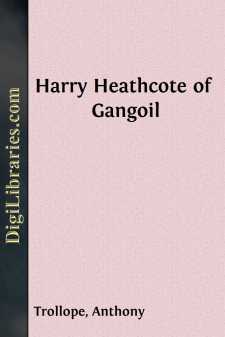Categories
- Antiques & Collectibles 13
- Architecture 36
- Art 48
- Bibles 22
- Biography & Autobiography 813
- Body, Mind & Spirit 142
- Business & Economics 28
- Children's Books 16
- Children's Fiction 13
- Computers 4
- Cooking 94
- Crafts & Hobbies 4
- Drama 346
- Education 46
- Family & Relationships 57
- Fiction 11829
- Games 19
- Gardening 17
- Health & Fitness 34
- History 1377
- House & Home 1
- Humor 147
- Juvenile Fiction 1873
- Juvenile Nonfiction 202
- Language Arts & Disciplines 88
- Law 16
- Literary Collections 686
- Literary Criticism 179
- Mathematics 13
- Medical 41
- Music 40
- Nature 179
- Non-Classifiable 1768
- Performing Arts 7
- Periodicals 1453
- Philosophy 64
- Photography 2
- Poetry 896
- Political Science 203
- Psychology 42
- Reference 154
- Religion 513
- Science 126
- Self-Help 84
- Social Science 81
- Sports & Recreation 34
- Study Aids 3
- Technology & Engineering 59
- Transportation 23
- Travel 463
- True Crime 29
Sort by:
by:
Anthony Trollope
can never bring myself to believe it, John," said Mary Walker, the pretty daughter of Mr. George Walker, attorney of Silverbridge. Walker and Winthrop was the name of the firm, and they were respectable people, who did all the solicitors' business that had to be done in that part of Barsetshire on behalf of the Crown, were employed on the local business of the Duke of Omnium who is great in...
more...
by:
Anthony Trollope
CHAPTER I Dillsborough I never could understand why anybody should ever have begun to live at Dillsborough, or why the population there should have been at any time recruited by new comers. That a man with a family should cling to a house in which he has once established himself is intelligible. The butcher who supplied Dillsborough, or the baker, or the ironmonger, though he might not drive what is...
more...
by:
Anthony Trollope
INTRODUCTION There is the proper mood and the just environment for the reading as well as for the writing of works of fiction, and there can be no better place for the enjoying of a novel by Anthony Trollope than under a tree in Kensington Gardens of a summer day. Under a tree in the avenue that reaches down from the Round Pond to the Long Water. There, perhaps more than anywhere else, lingers the...
more...
by:
Anthony Trollope
CHAPTER I. THE EARLY HISTORY OF LADY LOVEL. Women have often been hardly used by men, but perhaps no harder usage, no fiercer cruelty was ever experienced by a woman than that which fell to the lot of Josephine Murray from the hands of Earl Lovel, to whom she was married in the parish church of Applethwaite,—a parish without a village, lying among the mountains of Cumberland,—on the 1st of June,...
more...
by:
Anthony Trollope
Chapter I. HIS RETURN FROM EXILE. Cicero's life for the next two years was made conspicuous by a series of speeches which were produced by his exile and his return. These are remarkable for the praise lavished on himself, and by the violence with which he attacked his enemies. It must be owned that never was abuse more abusive, or self-praise uttered in language more laudatory. Cicero had now done...
more...
by:
Anthony Trollope
CHAPTER I. INTRODUCTION. It may be doubted whether a brighter, more prosperous, and specially a more orderly colony than Britannula was ever settled by British colonists. But it had its period of separation from the mother country, though never of rebellion,—like its elder sister New Zealand. Indeed, in that respect it simply followed the lead given her by the Australias, which, when they set up...
more...
by:
Anthony Trollope
In vain, after that, did Anty try to sleep; turn which way she would, she saw the bloodshot eyes and horrid drunken face of her cruel brother. For a long time she lay, trembling and anxious; fearing she knew not what, and trying to compose herself—trying to make herself think that she had no present cause for fear; but in vain. If she heard a noise, she thought it was her brother's footstep, and...
more...
by:
Anthony Trollope
CHAPTER I GANGOIL. Just a fortnight before Christmas, 1871, a young man, twenty-four years of age, returned home to his dinner about eight o'clock in the evening. He was married, and with him and his wife lived his wife's sister. At that somewhat late hour he walked in among the two young women, and another much older woman who was preparing the table for dinner. The wife and the wife's...
more...
by:
Anthony Trollope
"Omnes Omnia Bona Dicere" When young Mark Robarts was leaving college, his father might well declare that all men began to say all good things to him, and to extol his fortune in that he had a son blessed with so excellent a disposition. This father was a physician living at Exeter. He was a gentleman possessed of no private means, but enjoying a lucrative practice, which had enabled him to...
more...
by:
Anthony Trollope
CHAPTER I. THE MARQUIS OF KINGSBURY. When Mr. Lionel Trafford went into Parliament for the Borough of Wednesbury as an advanced Radical, it nearly broke the heart of his uncle, the old Marquis of Kingsbury. Among Tories of his day the Marquis had been hyper-Tory,—as were his friends, the Duke of Newcastle, who thought that a man should be allowed to do what he liked with his own, and the Marquis of...
more...











